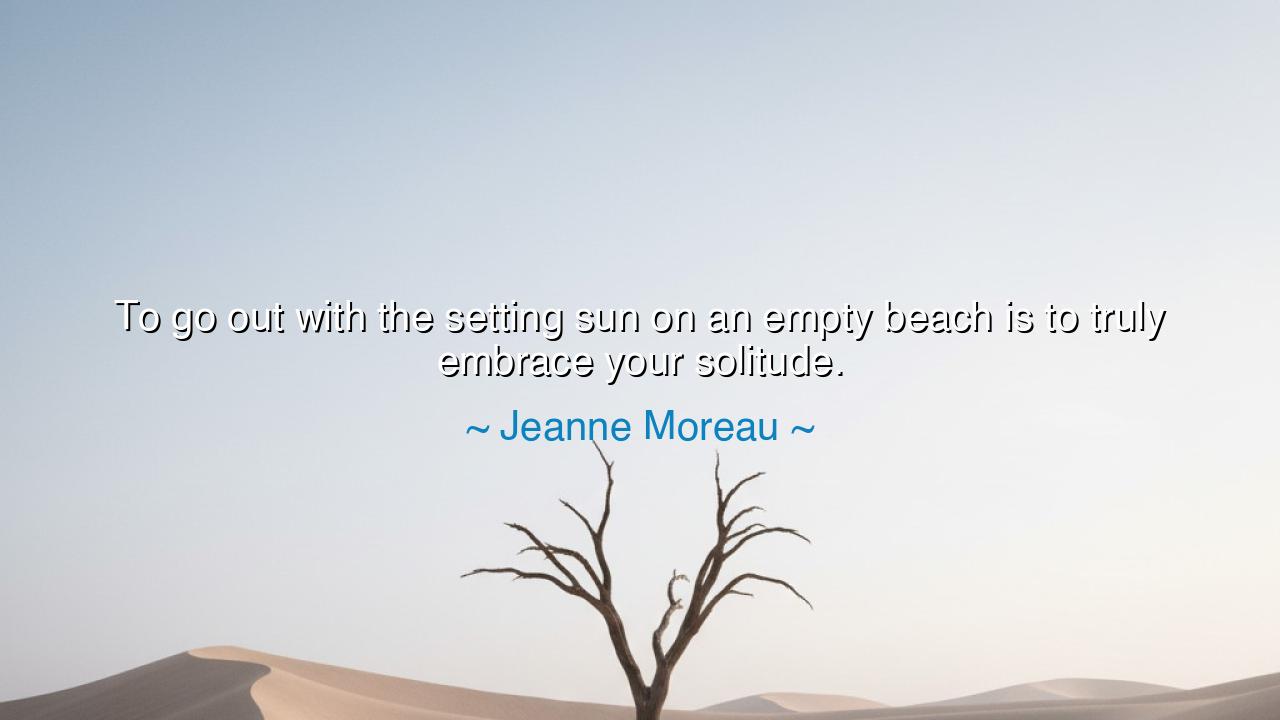
To go out with the setting sun on an empty beach is to truly






"To go out with the setting sun on an empty beach is to truly embrace your solitude." These evocative words by Jeanne Moreau invite us to contemplate the deep connection between solitude and peace—a kind of serenity that comes when we are fully immersed in the natural world and free from the distractions of modern life. The image of the setting sun on an empty beach is not one of desolation, but of freedom, of standing before the vastness of nature and allowing it to wash over the soul. In this moment, we are not isolated or lonely, but deeply connected to the rhythms of the earth and to our own inner selves.
In the ancient world, solitude was often seen as a path to wisdom and self-knowledge. Socrates taught that in order to truly understand oneself, one must often retreat from the distractions of society and spend time in quiet reflection. The greatest minds of antiquity understood that solitude offered an opportunity to engage with the deepest questions of life—without the interference of others’ opinions or societal expectations. Like Moreau’s image of the solitary figure on the beach, Socrates sought to stand apart from the world, not as a way to escape, but as a means to find clarity and truth. The solitude of the beach, with its endless horizon and the dying light of the sun, echoes this philosophical journey toward self-realization.
Consider the life of Diogenes, the ancient Greek philosopher who embraced solitude in the most extreme way. Diogenes rejected society’s norms and lived in a barrel, wandering the streets of Athens in search of truth and authenticity. He believed that to be truly free, one had to shed the distractions and attachments of society. Though his form of solitude was extreme, his dedication to living in accordance with his own ideals was a testament to the ancient understanding that solitude—in its purest form—can lead to profound inner peace and clarity. Like Diogenes, Moreau’s quote suggests that by embracing solitude, we open ourselves to the deep truths that only emerge when we are alone, unencumbered by the noise of the world.
The setting sun, as mentioned by Moreau, is a symbol of the cycles of life, the inevitable passing of time, and the opportunity to reflect on the day’s events and our place within them. The ancient Romans celebrated the passage of time through their rituals and poetry, often finding a sense of peace in the acceptance of life’s fleeting nature. Horace, the great Roman poet, wrote about the necessity of enjoying the present moment, while recognizing that it, like the sun, is constantly fading into the horizon. Moreau’s solitude on the beach, watching the sun set, invites us to engage in a similar reflection—to recognize the transience of life and the importance of embracing solitude as a way to reconnect with the deeper meanings of our existence.
Moreau’s words also resonate with the teachings of Buddha, who encouraged followers to seek inner peace through meditation and self-awareness. The empty beach can be seen as a metaphor for the stillness of the mind, a space free from distractions, where one can listen to the whispers of the soul. Buddha taught that solitude is not an escape from the world, but a way to turn inward and find clarity in the midst of the chaos that often surrounds us. Just as the empty beach allows Moreau’s character to find peace, so too does solitude offer us the opportunity to reconcile with ourselves, to come to terms with the impermanence of life, and to find balance and wisdom.
The lesson here is profound: to embrace solitude is not to reject the world, but to accept it in its fullness. In a world filled with noise, distractions, and constant demands for our attention, we must learn to carve out moments of peace and stillness. Whether through a quiet walk on the beach, moments of meditation, or time alone in nature, we must seek those spaces where we can truly listen to our inner voice. Just as the sun sets and the world quiets down, so too must we find those moments where we allow ourselves to reflect on life’s beauty, its challenges, and its fleeting nature.
In practical terms, we must prioritize moments of solitude in our daily lives. We are constantly connected to others, whether through work, family, or the demands of modern life. Yet, to grow, to find peace, and to reconnect with our authentic selves, we must make room for stillness. We can seek out nature, take time for quiet walks, or simply disconnect from technology for a while. Like the figure in Moreau’s image, walking alone on the beach as the sun sets, we can embrace solitude as a way to find renewal, peace, and clarity.
In conclusion, Jeanne Moreau’s reflection on solitude invites us to embrace those quiet moments as opportunities for self-discovery and renewal. Just as the ancients understood that true wisdom comes from introspection and reflection, so too must we recognize the importance of solitude in our own lives. By walking alone on the empty beach of our own thoughts, we can reconnect with the cycles of life, embrace the transience of existence, and find a deeper understanding of who we are. Let us then take Moreau’s words to heart, seeking solitude not as isolation, but as a space for restoration and growth.






AAdministratorAdministrator
Welcome, honored guests. Please leave a comment, we will respond soon